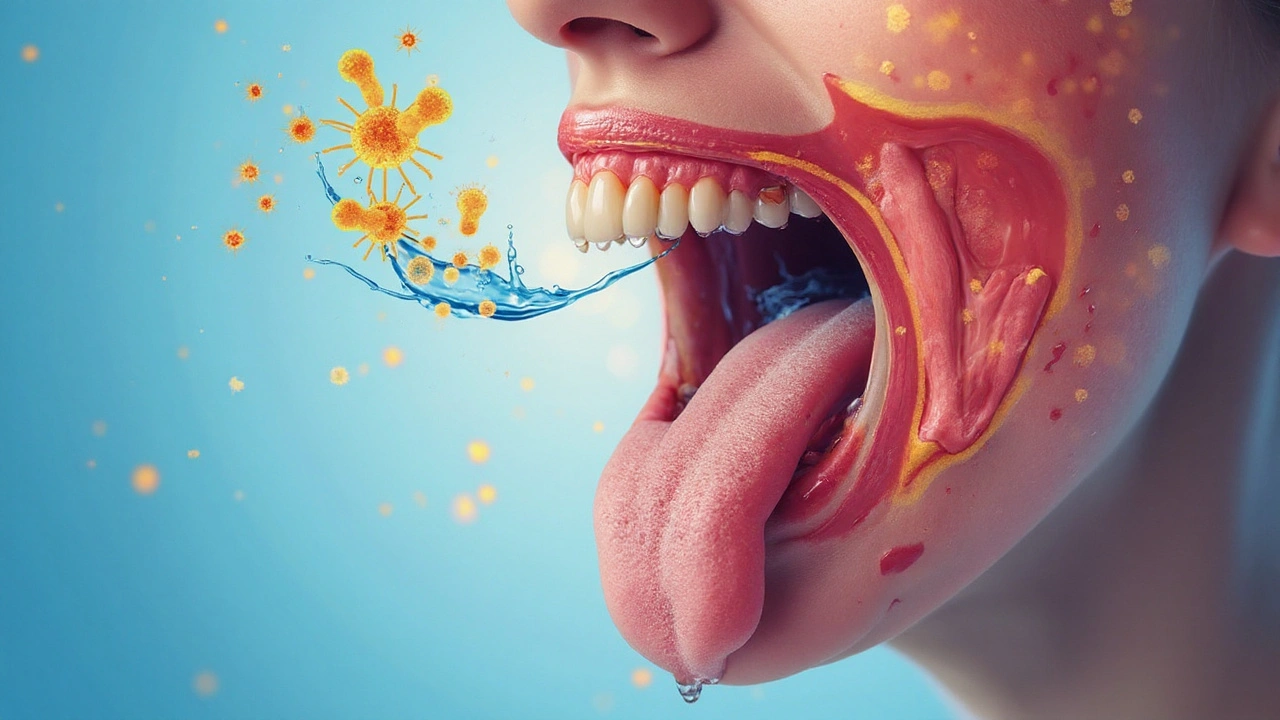Waking up with a mouth that feels like the Sahara? You’re not alone. In fact, almost everyone experiences dry mouth at some point, and for some people, it becomes a daily, annoying reality. But here’s the kicker—dry mouth isn’t just uncomfortable or awkward when chatting with friends or coworkers. It’s one of the biggest reasons behind stubbornly bad breath that just won’t quit. If you’ve ever popped a mint only to realize it didn’t help much, the reason might just be in your own saliva (or the lack of it).
Why Dry Mouth Wreaks Havoc on Your Breath
First, let’s dig into what’s really going on when your mouth feels like cotton. Your saliva does more than just help you swallow or taste food—it’s a superhero in the world of oral health. Saliva literally washes away food particles, neutralizes acids produced by bacteria, and helps keep those bacteria in check. Without enough of it, your mouth turns into a playground for the types of bacteria that love to produce stinky sulfur compounds. These compounds are what usually make breath turn from normal to, well, yikes.
The science backs this up: a 2022 study in the Journal of Clinical Dentistry found that up to 80% of chronic bad breath cases had one thing in common—low saliva flow. That means chronic dry mouth is rarely just an inconvenience; it fuels the perfect storm for bad breath. The medical term for chronic dry mouth is xerostomia, and it’s more common than you’d guess. Around one in four adults deals with it regularly. It's even worse if you’re on certain medications like antihistamines or antidepressants, as these can slow down your saliva production. Even dehydration, stress, and simply breathing through your mouth at night (hello, snorers and allergy sufferers) can sap the moisture right out of your mouth.
Dry mouth doesn’t just power up bad breath, though—that would be bad enough. Saliva also helps protect your teeth from decay, and without it, you’re not just dealing with stinky mornings but a real spike in cavities and gum issues, too. It’s a double-whammy most people overlook until they’re facing a cavity or two. Think of your saliva as your mouth’s built-in self-cleaning system, and without it, all those tossed mints don’t stand a chance.
I remember this hitting home when my kid Sorrel went through a phase of mouth breathing from a stubborn allergy. Not only did they wake up cranky, but their breath could knock over a houseplant. Switching to a saline nasal spray turned out to be a game-changer—less dryness, happier mornings, and way less talk about dragons (their way of describing that "fiery" breath).
If you want to put data behind the misery, check out this simple breakdown based on research by the American Dental Association:
| Cause of Dry Mouth | % of Cases Reporting Bad Breath |
|---|---|
| Medications | 62% |
| Dehydration | 47% |
| Mouth Breathing (Night) | 70% |
| Medical Conditions (like Diabetes) | 53% |
So, the connection is crystal clear. But if that’s the case, why doesn’t everyone just drink more water and call it good? Turns out, it’s a bit more complicated—and that’s where real tips come in.

Clearing the Air: Myths and Facts About Bad Breath from Dry Mouth
Everyone’s got a trick for fresh breath—or claims they do. Gum, sprays, mints, gargling, or just not talking (kidding, but only a little). The truth? Some of these classic methods are pretty much placebos if dry mouth’s running the show. Which ones do the trick and which are just masking the problem?
First up, water. Super basic, but it really does help. Sipping water throughout the day keeps your mouth moist and gives your saliva glands a fighting chance. But chugging a whole glass after eating garlic won’t instantly erase the smell, and it definitely won’t fix chronic dryness. You want little sips here and there, especially if you’ve had coffee or alcohol—both known to dry out your mouth fast.
Caffeine fans, brace yourselves. Regular coffee drinkers are more prone to dry mouth, and a survey from 2023 showed that people drinking more than three cups a day were twice as likely to have noticeable morning breath, regardless of brushing. Black tea’s a slightly better option for your mouth moisture, but it’s still a mild dehydrator compared to plain old H2O.
But what about all those “bad breath” products? Mints may freshen for a minute, but most are loaded with sugar—great news for mouth bacteria, terrible for your breath. Sugar-free gum is better, and here’s why: chewing triggers your saliva glands to kick into gear. Studies have shown that popping a stick of gum right after eating actually triples your saliva flow for 20 minutes—a welcome boost if you’ve got a naturally dry mouth.
Don’t be fooled by mouthwash, either. That blue stuff often contains alcohol, which dries things out even more. For real help, go for a mouthwash or rinse labeled "alcohol-free" and look for ones containing xylitol. Xylitol is a sweetener that can actually help stimulate saliva, and bacteria hate it, which is an excellent combo for fresh breath fans.
Busting the garlic myth: brushing your teeth doesn’t always erase that perfume you cooked up last night. Why? Because garlic’s sulfur compounds get absorbed into your bloodstream and travel to your lungs, so your breath can smell garlicky until your body processes it out. No amount of mints or extra brushing will completely erase that, but staying hydrated and using xylitol gum can at least help until the odor passes.
And here’s an overlooked culprit—skipping meals. Saliva production ramps up when you’re chewing, so fasting or low-carb diets can leave your mouth drier than usual. If you can’t eat, at least chew some sugar-free gum or crunch on something like celery or apple slices, which are nature’s toothbrushes and excellent for boosting moisture.
As the Mayo Clinic puts it:
“Persistent dry mouth affects both the health of your teeth and the comfort of your day-to-day life. Simple hydration and mindful oral care routines are vital first steps toward relief and fresher breath.”
When my own routine gets wild (hello, school runs and endless errands), the only thing that keeps my breath in check all day is stashing xylitol gum in every bag, car compartment, and coat pocket. Does it actually work? Totally. My dentist, who’s been at this for decades, always preaches the gum-over-mint gospel every six months. I’m still cavity-free, and my coffee habit hasn’t gotten me side-eyed at morning pickups—yet.

Smart Solutions: Tips for Keeping Dry Mouth and Bad Breath at Bay
If you’re tired of worrying about your breath every time you lean in to chat, steal some of these tried-and-true hacks. Science and personal experience both say they work better than any quick-fix spray or mystery mouthwash.
- Sip, don’t slug: Drink water regularly. If plain water gets boring, infuse it with cucumber, lemon, or berries. It’s more fun and gives you micro-sips throughout the day, keeping your mouth from drying out.
- Chew things that crunch: Celery sticks, apple slices, carrots—all fantastic for saliva. Bonus: they physically help scrub your teeth and taste great. Kids love them, too.
- Go sugar-free: Keep xylitol gum handy. It outperforms mints, isn’t sticky, and actually starves the bad bacteria. Try brands like Spry or PUR, which avoid artificial flavors.
- Read those mouthwash labels: Alcohol-free is a must if dry mouth’s a problem. Look for xylitol and avoid harsh ingredients when you can.
- Breathe through your nose: Way too many people default to mouth breathing, especially when sleeping. Using nasal strips, saline nasal rinses, or even mild allergy meds can make a massive difference in moisture levels.
- Brush and floss—often, but gently: Taking care of your gums and teeth means fewer places for bacteria to hide out and cause problems. Don’t forget to brush your tongue. That’s where a lot of the smell hides out.
- Skip the snacks that stick: Dried fruits, crackers, candy—they linger in your mouth and give bacteria something to munch on. Stick to fresh, water-rich foods as much as possible.
- Review your medications: Ask your doctor if anything you take for allergies, blood pressure, anxiety, or pain relief could be drying your mouth. Sometimes there are swap options or timing tricks that can help reduce the dryness.
- Talk to your dentist or hygienist: If your mouth still feels parched all the time, ask about prescription-strength solutions. There are specialized sprays, gel rinses, and even saliva substitutes that can give relief if water and gum aren’t enough.
Here’s the thing—no one wants to whisper when they’d rather laugh out loud. Dry mouth isn’t always avoidable, but being clued-up means it doesn’t have to ruin your day, your work meeting, or that cute coffee date. Tackle it from every angle—hydration, smart snacks, and a little label detective work. Your breath (and anyone within earshot) will thank you.

Been there. Chewing xylitol gum nonstop since my dentist told me my saliva flow was basically a desert. No more morning dragon breath. 🍃✨
Saliva is the unsung hero of oral hygiene, like a tiny, wet knight fighting off the sulfur goblins. We take it for granted until it’s gone and then we’re all like ‘why does my breath smell like a gym sock left in a hot car?’
Bro i just drink water and call it a day. Why make it so complicated? Just hydrate. Also stop drinking coffee like its water. 🤦♂️
Of course you need gum. You’re not a caveman. You’re a human who chose to live in a world with caffeine and air conditioning. You’re asking for trouble.
It’s fascinating how the entire modern oral hygiene industrial complex is built on the myth that you can ‘fix’ dry mouth with sugar-free gum. The real issue is systemic dehydration caused by late-stage capitalism and over-medication.
My grandma from rural Alabama used to chew on fresh parsley after every meal. Said it was ‘nature’s breath freshener.’ Honestly? Worked better than any mint. Try it. 🌿
Let’s talk about xylitol’s mechanism of action: it’s a non-fermentable pentitol that inhibits Streptococcus mutans adhesion and reduces acid production. It’s not magic-it’s microbiome modulation. 🧬
Also, nasal breathing isn’t just about dry mouth-it’s about vagal tone, oxygen saturation, and sleep architecture. Mouth breathers? You’re basically running a low-grade hypoxic stress response all night.
And before you say ‘I’m just a snorer,’ that’s not normal. That’s a sign of upper airway resistance syndrome. Get a sleep study. Your breath isn’t the only thing suffering.
Also, celery? It’s not just crunchy-it’s fibrous and stimulates parotid secretion via masticatory reflex. It’s functional food. Not a snack. A therapeutic intervention.
And yes, I’ve had Sjögren’s. I know what ‘Sahara’ feels like. You’re not exaggerating.
Don’t use alcohol-based mouthwashes. Ever. They’re like pouring gasoline on a fire. You’re not killing bacteria-you’re killing your mucosal barrier.
Hydration isn’t about chugging. It’s about maintaining osmotic balance. Sip. Constantly. Like a hummingbird at a feeder.
And if you’re on SSRIs? Talk to your prescriber about switching to bupropion. Less xerostomia. Less existential dread. Win-win.
And for the love of all that’s holy, stop using breath mints as a substitute for dental hygiene. You’re not fooling anyone. Not even yourself.
I’ve seen patients with 15 cavities because they thought ‘minty breath’ meant ‘healthy mouth.’ It doesn’t. It means you’ve been lying to yourself for years.
Go get a salivary flow test. It’s 10 minutes. It’ll change your life.
And yes, I’m a dentist. And yes, I still chew xylitol gum. 🍬
Bro, this is African wisdom too. In my village, we chew on neem sticks. Not gum. Not mint. Neem. Kills bacteria, strengthens gums, and tastes like earth and power. You think your xylitol is magic? It’s just science trying to catch up to tradition.
And water? We don’t sip. We drink like the river is calling your name. You think you’re hydrated? You’re just damp.
Also, your dentist? He’s not your friend. He’s your last resort. Prevent it before you need him.
Man i never knew chewing celery was a thing. I thought it was just for rabbits. But i tried it this morning and wow. My mouth felt alive. Like my tongue remembered how to feel things. Thanks for this.
Bro I tried the xylitol gum. Lasted 3 minutes. Then I just ate a raw onion. Now my breath smells like a Bollywood movie. Progress?
My wife says my breath smells like a dumpster behind a gas station. I’ve tried everything. Water. Gum. Mouthwash. Even that fancy $40 spray from Sweden. Nothing works. I think I’m cursed.
It is not surprising that individuals who neglect the fundamental biological imperative of hydration are now attempting to compensate for their systemic negligence through the consumption of chemically engineered chewing gum. This is not a solution-it is a symptom of cultural decay.
Wait-so you’re telling me that alcohol-based mouthwash makes dry mouth worse? I’ve been using Listerine for 12 years. I thought it was helping. I’m devastated. 😢
Let me just say, as someone who has spent the last 20 years studying the intricate biochemical pathways of oral microbiota and their correlation with systemic health, I cannot stress enough how profoundly the reduction of salivary flow impacts not only oral health but cognitive function, mood regulation, and even social bonding-because who wants to be near someone who smells like old socks and regret? And yet, so many people treat this as a cosmetic issue rather than a physiological emergency. You wouldn’t ignore a leaky pipe in your basement, so why ignore a leaky salivary gland? It’s not about gum. It’s about reverence for your own biology. Please, for the love of all that is holy, hydrate, chew, and breathe through your nose-not because it’s trendy, but because your body is begging you to stop treating it like a disposable machine.
Let me guess-you’re the type who thinks xylitol is ‘magic’ and that your dentist is your spiritual guide? Newsflash: your saliva doesn’t need a corporate sponsor. It needs silence. Stillness. A break from your 17 daily habits that are trying to ‘fix’ what nature already designed to self-regulate.
Chewing gum? That’s not healing. That’s performance. You’re acting out a role in a wellness TikTok.
And ‘breath through your nose’? You think I don’t know that? My nose is clogged because I live in a city where the air tastes like burnt plastic and regret.
Stop selling solutions. Start admitting the truth: we’re all just breathing poison and pretending we can gum our way out of it.
So let me get this straight-Americans are now paying $12 for gum that tastes like cardboard because they’re too lazy to drink water? Meanwhile, in Nigeria, people chew tree bark and live to 90. This is why the West is collapsing.